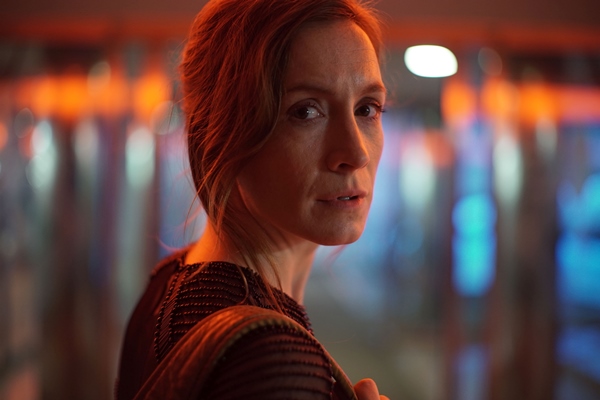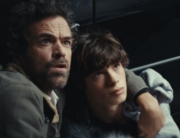This fascinating sci-fi drama takes place in the near-future when our planet has become largely uninhabitable and humans have begun relocating to Mars. They do so on an enormous, space-faring cruise ship, which offers all sorts of amenities, including a virtual reality room called MINA. Here passengers can re-experience their own memories of the Earth as it once was, with assistance from a therapist known as a mimarobe.
During what is supposed to be a routine voyage, a freak accident causes the Aniara to steer it off course. As a result, the three-week journey now becomes a voyage with no determinable end point. The captain and his crew’s best hope is to use the gravity of the next celestial body they encounter to turn the ship around. However, that could take an estimated two years, and maybe even longer. The vessel’s mimarobe, MR (Emelie Jonsson), observes her fellow passengers as they react to this shocking change in their fortunes. Given MINA’s ability to calm the human brain, soon both she and it are in high demand.
From the outset, the filmmakers make a key decision to center the narrative on MR, who due to her exposure to MINA, is relatively in touch with her own feelings. She is especially warm and empathic compared to the ship’s captain, Chefone (Arvin Kananian), who hides just how dire the ship’s situation really is behind a poker face; and Isagel (Bianca Cruzeiro), the aloof pilot, who may reciprocate MR’s attraction toward her. The fact that MR is in tune with her emotions allows her to adapt to the increasingly stressful circumstances while others crumble.
One of the keys interests of the film is to explore how people adapt once cut off from their planet of origin and the rest of humankind. Captain Chefone manages to organize the populace into a functional society: people are given jobs; algae, grown onboard, becomes the main food source; and a shared culture develops. But then directors Pella Kagerman and Hugo Lilja, who also co-wrote the screenplay, boldly leapfrog ahead weeks and then years, so we witness this civilization decline through a combination of hedonistic excess, widespread despair, and Chefone’s increasingly brutal regime.
Despite frequent moments of psychological intensity, the film’s earliest scenes have a deadpan quality. When MR and others arrive by shuttle to the space dock, where they will switch over to the Aniara, a friendly-yet-officious voice on an intercom insists the passengers stay seated until “the fasten seat belt light turns off.” Similarly, following the disaster that sends the spacecraft off course, one of the first things that Chefone tells the shocked passengers is they will be credited for the extra time it takes to reach Mars.
Kagerman and Lilja also keep the scenario from becoming too bleak—at least for a time—through MR and Isagel’s relationship. There are love scenes in which all of the tension of their situation gets a much-needed release, and the pair seems well-suited, although the idea of starting a family is complicated by Isagel’s fear of bringing a child into what she views as a prison.
We seem to have entered a golden age of sci-fi movies with strong, complicated female protagonists—see Arrival (2016), Ex Machina (2014), and Mad Max: Fury Road (2015)—but what sets Aniara apart is the presence of a woman helmer. Is it a coincidence that it has not just one but quite a few memorable and nuanced female characters, including MR’s cabinmate, a bitter, middle-aged astronomer (Anneli Martini) who is unafraid to tell truth to power? On the other hand, there is an undertone of misogyny toward women from the male bridge crew members, including Chefone, who are constantly dismissive of MR and Isagel. The film also deals with the issue of postpartum depression, which apparently, still goes underdiagnosed at whatever time this story line is taking place.
Aniara features visual effects that range from effective to highly evocative, with the design of MINA belonging in the latter category, as it resembles glowing water that moves in a patient rhythm, reflecting the tranquility it supposedly inspires. MINA actually undergoes a drastic change midway, acquiring sentience in a B-movie-type development that the screenwriters wisely abandon quickly. It stands out as a rare misstep, as does the lack of depth given to Chefone, who comes across as less a tragic antagonist than a convenient source of conflict, although viewers start to understand his inner torment toward the end.
Speaking of endings, the denouement may leave some viewers unsatisfied, as the outgoing message appears to be something like, “The life or lives of any individual or civilization add up to nothingness.” Perhaps what we are supposed to take away are lessons for how not to construct a society or, better yet, how not to end up floating through space in a broken-down ship for an indefinite period of time. Step one: save planet Earth. Stop global warming. Sounds good to me.







Leave A Comment